CHAPTER FOURTEEN
Wisconsin - A Servant of the People
My mother had trepidations about moving back to LaCrosse. It held many
ghosts from the past, including my stint at the children's home and many
creditors. As she told me in her July 1, 1963 letter, "I am a little
unsure as to whether I am doing the right thing in going back there, but
I do like that part of the country and I feel that the money is good."
She told me her new salary at the Family Service Association was $550
per month. After the dust settled on her new job she found, "The salary
here is higher, but it puts me into a higher [tax] bracket, so I actually
only receive $35 more than Fargo." She was obviously disappointed,
but that was still a considerable sum for a woman to be earning in 1963.
Her position was that of social worker, but now she counseled entire families,
not just pregnant teens.
She had been well liked at Lutheran Welfare, as a letter she got from
a former co-worker pointed out: "I get a strange, vacant feeling when
I realize that you are no longer in Fargo. Even tho I didn't see too much
of you after [I left] LWS, I always had the comfortable feeling that you
were only a phone call away. I must confess that in my long lifetime I
haven't felt that way about very many people. You were and are something
special. I certainly enjoyed working with you at LWS and you did a great
deal to make life there liveable. I kid you not. Love, Bernice."
I have no recollection of why she moved away from Fargo, but perhaps
Dad's behavior and my own juvenile record began to haunt her. She must
have moved quickly, for she told me in a postcard from LaCrosse, "I
have been up to my neck in work. The new place was filthy so I had walls
to wash and the kitchen to paint before I could step in to it. The furniture
took a week to come. I had to stay in a hotel, so no new dress - ha, ha."
In a letter sent about the same time, she talked about the short visit
she had just made to see me in Utah and ended with, "Thank you for
your love while I was with you. It was quite a warm shawl that you gave
me as you sat on my bed and told me you loved me and that you did not hold
my strictness against me."
Repeatedly, she told me how much she enjoyed the west. "I wish
I were in Zion also," she told me may times. "I did so love that
country round there. It was like being in another world. Maybe it will
happen that I will be able to live on a nice piece of land one of these
days." Thirty years later she finally made it, but to a one-room apartment,
not to her dream home.
Initially, she told me she liked the new job in LaCrosse. However, the
same sentence gave an inkling of things to come: "You will be glad
to know that I like this work here. It's very confining. All interviews
are by anointment and one doesn't leave ones office all day long."
"One of the silly rules of this agency," she wrote, "is
that I must attend vocational school. I plan to learn professional typewriting
I think. Either that or sewing. There is not much else that I am interested
in. Typing would be good for freelance writing." Whenever we moved,
there was always stacks and stacks of sewing magazines and manuscripts.
At Lutheran Welfare, she had been constantly on the go, just as she
had been while at the Jamestown Sun. This new life was too well
orchestrated, and she soon struck out to broaden her horizons. As she once
wrote to me, "I've been out every night and all day Sunday. Nothing
exciting, but I just couldn't bear to stay home."
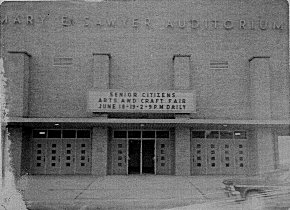 Much to the chagrin of her new boss, my mother started working after hours
in a new arena - senior citizens. She started slowly by organizing talent
and craft shows, and continued upward from there. More than once she donated
her vacation time to set up these events. She became one of the first people
in the United States to organize activities and programs for seniors. Her
life was about to make another dramatic change as her influence increased.
Much to the chagrin of her new boss, my mother started working after hours
in a new arena - senior citizens. She started slowly by organizing talent
and craft shows, and continued upward from there. More than once she donated
her vacation time to set up these events. She became one of the first people
in the United States to organize activities and programs for seniors. Her
life was about to make another dramatic change as her influence increased.
Meanwhile, life under "Mr. K." became onerous. Social workers
had a habit of leaving Family Service Association due to his bad attitude,
according to my mother. She became determined to move on as well, but not
before laying some ground work. "I intend to 'fight city hall,' but
I have to marshal my tactics," she wrote. "I can tell you that
several times these past few weeks I've had to bite my tongue until the
blood came. I have never wished so hard in my life that I was a man. I'd
have knocked him down and pushed some of his orneriness down his throat."
Perhaps her boss was jealous of her new-found influence and the fact
he was not as well liked. Perhaps he resented her after-work activities.
Whatever the reason, he cracked down the only way he could. "He is
now giving me lessons in social work," Mom wrote. "I have to
prepare little sheets each day showing how I proceed in my work because
I have 'been doing a great deal of damage in my counseling.' I think the
real reason is that I have been asked to speak at several places that he
was not asked, and the end result is ornery behavior on his part. That,
and the fact he got chewed out by top brass and Community Chest [the sponsoring
fund raiser]."
During this same time period, I completed my last year of high school
in Utah. I was then released from any responsibility for the trouble I
had gotten into back in Fargo. Where should I go next?
Mom wrote me a letter telling she was sick, and it was easy for me to
convince myself she was dying. She needed me.
From her viewpoint, the ghosts around LaCrosse must have been too strong.
She politely tried to steer me away from rejoining her. We talked about
my going on to college. The more she encouraged me to move on, the more
determined I became to go back to Wisconsin. I didn't know Dad was with
her. Her anxiety could have been simply that she didn't want to admit that
this particular ghost was still haunting her. On December 23, 1963, I kissed my girlfirend goodbye and headed to LaCrosse.
When I arrived at her rented home, I was shattered. "What are you doing here?" she asked. Not only was she not dying,
Mom didn't know what to do with me. I banged around aimlessly for a few
months, and finally went back to Utah for college. I had done quite well
during my last year of high school, and discovered a part of me that never
flowered in North Dakota - performing in public.
As I re-started my life at a junior college in Utah, I grabbed every
life experience I could get my hands on. I became involved in every aspect
of small campus life and even ran for office many times. I was in every
play I could get into. Sleep became a hindrance.
Mom had always told me, "Sleep is death," and she was also
burning the candles at both ends back in Wisconsin.
In January of 1965, she was cast as Jane Chandler in a community theater
production of "The Night of January 16." It was only a bit part, but she reveled in it.
In August of 1965 she landed a part in the most delightful play, "The Boyfriend." This had been the vehicle that started Julie Andrews career, and now it was being presented in a tent at Mt. LaCrosse, a ski resort. I watched every performanace, and fell in love with it. Mom was absolutely delightful. . . . "And the double-distilled British pair Lord and Lady Brokhurst by Joseph Breuer and Marianne O'Neil furnished some of the high hilarity of the evening. . . . every one contributed to the gaiety and bounce of the whole show."
She wanted more parts in
other plays, but never got them. She was particularly disappointed that
she did not get the part of the mother in the story about Joan of Arc called
"The Lark." The director of the theater asked her specifically to
try out for another play called "The Visit," and then gave the part
to someone else. "I would not want him to know that I was bitterly
disappointed," she wrote. "Especially as he had called me and
coaxed me to help out." She admitted in one of her letters to me she
was "a bit envious" when I captured the lead role in "All My
Sons" when I returned to Snow College after summer break.
She applied for a newly
created position as coordinator of services for the LaCrosse Committee
on Aging. "Mr. K." had told the president of the board of directors
at Family Service Association that the committee on aging would be badly
let down if it hired my mother. Instead, the president resigned at FSA
in order to become chairman of Mom's new committee.
"I don't feel K. is my rival," she told me. "He feels
that I am his, but I never felt that he was my rival. I feel that one has
to be in competition with someone before that person can be ones rival.
[But] Mr. K. is in another category. He is a wizard mathematician and has
a great deal on the ball when it comes to the study of neurotic and psychotic
behavior. I am not competing there."
Her boss continued to pressure her, and at one point there was even
meetings about retaining her. A board member who was also a judge came
to my mother's defense, and she was kept on. Not only did the judge(1)
support her, he gave her a letter of recommendation "that is worthy
of framing."
As she explained to me at the time, "I'm still hanging in there.
I find walking the mile for the general tough going, and then I say, 'what
is a mile?' and on I march." This idea of not being required to walk
20 miles at once was a favorite theme of hers. She constantly told me to
concentrate on walking "just the first mile" of any challenge.
When that mile was completed, the next mile could be tackled, and so on.
At one point, shouldering her heavy burden at work and still not having
enough money to pay the bills caused even her to admit, "I am crawling
an inch for the general. I'll make it to the end of the mile, though."
Mr. K. Did "his level best" to see Mom was not hired by the
new committee. But my mother decided "I might not get that job, but
I would get some job, even if it meant working as a waitress or as a nurses
aid. I determined that I would not leave LaCrosse." She was hired
March 15, 1966 and created a pilot project for the State of Wisconsin.
No one realized it at the time - including me - but she was 67 years old!
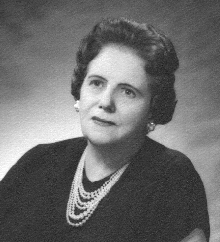 Her new position was tentative at first, and the Committee started out
with a one year charter under the direction of the mayor's office. She
kept building support for the work, and was then granted recognition as
a United Way agency. Her budget was never larger than wages for herself
and a secretary, but she managed to find funding and moral support for
almost 30 years.
Her new position was tentative at first, and the Committee started out
with a one year charter under the direction of the mayor's office. She
kept building support for the work, and was then granted recognition as
a United Way agency. Her budget was never larger than wages for herself
and a secretary, but she managed to find funding and moral support for
almost 30 years.
The LaCrosse Tribune article of April 24, 1966, described the startup of the project and included
a very youthful looking photograph:
Mrs. Marianne O'Neil has been appointed coordinator of services by
the LaCrosse Committee on Aging, according to Dr. Sigurd Siverston, committee
chairman.
Mrs. O'Neil has an office in Stoffel Court, 333 S. 7th St., which is open Monday through Friday. Telephone number is 782-8740.
It is hoped that all programs pertaining to senior citizens may be
coordinated through this office, Dr. Siverston said.
The LaCrosse Committee on Aging has received assistance under the
Older American Act, with some local matching funds. It is functioning under the auspices of the United Fund, but is awaiting full legal status.
LaCrosse is one of the first cities in the nation to inaugurate this
service, Dr. Siverston said. Plymouth is the only other city in Wisconsin which has a similar project, and the two cities will serve as pilot projects. The services of the coordinator are available free to anyone desiring information or assistance.
Mrs. O'Neil formerly was with Family Services Association in LaCrosse. Before coming to LaCrosse she was with Luthern Welfare of North Dakota for seven years and resided in Fargo N.D.
At the beginning, she didn't even have funds for office supplies. She
was always good at scrounging up what she needed, however, and in short
order filled an empty office with the essentials. The LaCrosse project
was to be assessed by the state of Wisconsin as a test. "We are the
guinea pigs," she told me. She already had the craft fair to offer,
and then set about creating a directory of services so seniors would know
what was available to them. Basically, the position was pretty much whatever
she designed into it. It was quite a challenge, and she wrote me after
the first week, "The job is terrific. I am tempted to run away at
times when I think of all that has to be done, but then I remember that
I have a good partner and just like always, He will carry me through. You
know Vinny, without God I am nothing. I am neither courageous, nor clever.
I am just his servant. Sometimes I get weak and tremble, but I do have
this knowledge - it might not be my way, but a way will be made for me."
She had a way with people and was able to charm her away around many
obstacles. She gave me the formula many times in her letters:
Cultivate the breathless "hi," and the friendly smile.
Speak and be spoken to. Like people and show them you like people. Don't
look down on people. Even if they are the most stupid and asinine - donkeys
have beautiful brown eyes. Look for the good in people, and remember, no
matter who or what the person is, he has something you can find to admire
- even if it's only his colossal conceit. What does it matter if people
think they are fooling you. You know and I know that liars and braggarts
only fool themselves. They labor under the babyish impression that they
fool the world. How tragic if one falls to the level of paying them the
compliment of taking them seriously.
For the life of me I cannot understand why you and I cannot be old
shoes together. All my young men clients get that way without much effort
on my part. All that I have ever asked is that you be a friendly companion
and a decent boy. I know I'm fussy and I know I am old countryish, but
dear boy, that's me.
Her work received national recognition, and she hosted at least one
state conference on aging. When she wasn't hostess, she acted as moderator
for many sessions held at the state and national level. Although the work
was hard, she enjoyed it very much. It also gave her a chance to get away
from some of the "ghosts" that were chasing her. As she told
me in 1966 while attending a conference: "It has been wonderful to
be incognito - no phone call to say, 'When will you send the check?'"
One of the services her new committee offered was something she called
"Pleasant Sunday Afternoons." Seniors would gather and entertain
one another with singing or story telling. There was lots of music. Eventually,
Mom roped all kinds of people into joining the fun - people of all ages
and experiences. Local politicians were expected to participate, and the
mayor's wife became very active. Meals were served. Card games were set
up for those who just wanted to watch. Bingo came to stay soon after.
Years later, Iris Owen told me the name "Pleasant Sunday Afternoon"
was exactly how her own family described their treasured times together.
It was the way people in England spent many happy hours before the advent
of television and radio.
A growing influence
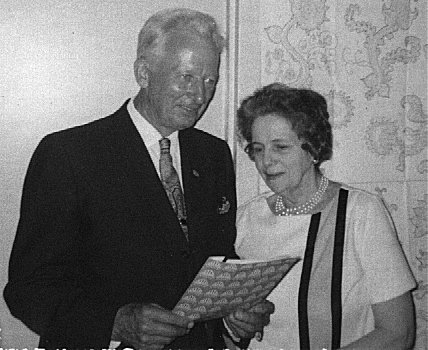 In LaCrosse, my mother kept plugging away and expanding her influence -
first to the state level, and then on a national scale. She was offered
a job in New York, but turned it down. She was offered several chances
to run for political office but turned them all down. She racked up friendships
with scores of people as she helped them. She also made a few enemies along
the way as she tried to remain autonomous and expand her services.
In LaCrosse, my mother kept plugging away and expanding her influence -
first to the state level, and then on a national scale. She was offered
a job in New York, but turned it down. She was offered several chances
to run for political office but turned them all down. She racked up friendships
with scores of people as she helped them. She also made a few enemies along
the way as she tried to remain autonomous and expand her services.
Photo - with Mayor Milo Knutson
Religiously and politically, my mother was a woman for all seasons.
She had the moral support and financial backing of labor, but joined the
Republican Presidential Task Force. She felt as comfortable in a synagogue
as she did in a cathedral. She threw out phrases in whatever language was
appropriate at the time, and smiled knowingly about every subject discussed.
She constantly told me to "Smile at everyone. Don't ever let those
who are against you know they have gotten to you." I thought she was
hypocritical, and felt she surely wasn't fooling anyone. Oddly enough,
I'm sure the various factions did know she played to both sides
of the aisle, but they didn't mind.
In 2009, their was a nation-wide debate about health care reform. Her grandson Sean said, "(there is) a story in the Washingtom Post which traces the origins of the 'Death Panel' myth (perpetrated by Sara Palin and others) to LaCrosse. It's cool to read what a progressive town LaCrosse is when it comes to senior quality of life. Perhaps the impact made by Marianne with her tireless advocation for seniors has had many lasting impacts."
As a child, I resented the fact my mother was always gone. In Wisconsin,
her business meetings continued to dominate her life. She was seldom home.
In fact, she often told me she wanted her epitaph to read, "Gone to
another meeting."
Her addiction to work earned her the loving nickname of "Mrs. Mule"
from my father. She would often declare how she would just put down her
head and keep on plugging along at whatever task faced her. We used to
look for donkeys along the road whenever we traveled. If we found some,
Dad would joke that he would stop and let Mom out of the car if she didn't
"behave." She liked the nickname so much, she used it privately
between us all her life. In turn, I became her "hungry horse."
Both "Mrs. Mule" and "Hungry Horse" were connected
very strongly in 1966. We could not have shared more similar behavior if
we had been blood relatives. While she was creating new projects left and
right in Wisconsin, I was unknowingly mimicking her life style in Utah.
When my sleepless nights cost me my part in "All My Sons," she
tried very hard to console me. Her letter of consolation hinted at some
of her own ghosts:
Your being so desperately busy has shown me the bad example I have
given you. I have always been too busy. Now you are too busy.
I get frantic with fear - fear that I may not be able to provide
for my family. You get frantic with fear that you won't be first. We both
are silly, aren't we. We both need to slow down - God will provide. And
He has right along - and still will. So why am I driving myself insane?
People who know you love and admire you - does the rest matter?
Your Dad always tries to be first - to swallow the whole world. He
has only succeeded in being last. Let you and I help each other to slow
down a little. We are solid family. We can weather storms together.
At the LaCrosse Committee on Aging, Mom decided people start getting
older the minute they are born, and so she cared about everybody. She was
working on a proposal in 1967 "to get young people participating more."
Instead of recreational programs for the youth, which she thought "does
nothing to prevent or cure delinquency," she wanted them to get involved
in the community. She proposed that the youth get active in "shows,
work programs, hootenannies, service projects of their own choosing, swimming
matches for all ages, pizza parties with the youth making their own pizzas.
In other words, I want the youth to have some normal deeds to do and to
have a normal place to do their showing off."
She felt teens needed "somewhere to go besides the outdoor theater,
tavern's and [fast food] drive ins." When a couple of disk jockeys
wanted to put a youth dance hall in the second floor of a tavern, however,
Mom balked. The city council passed an ordinance allowing the enterprise
to go forward, but Mom, "managed to get that ordinance rescinded in
short order." She told the attentive city fathers, "a teen dance
hall is good, but not over a tavern. I will help [the disk jockeys] all
I can if they find a better place."
She went before the city council on another evening for something entirely
different. She persuaded the members to write a letter of protest over
the drafting into the Army of a state aging worker. He was the area director
over four counties, but when he finished his post-graduate studies he became
a prime candidate for Vietnam. Although he was unpopular, Mom convinced
"the powers that be" to help him stay.
During a 1967 aging conference in New York, my mother explained how
wide-spread her programs were in Wisconsin. "Right now in LaCrosse
I've got several things going that even New York doesn't have," she
told me. A year later, she was visiting Washington D.C. to compare notes
with both Wisconsin senators.(2)
Not everyone wanted my mother to expand her programs to that broad of
an influence, however. Other agencies tried to join the growing boom toward
helping senior citizens, and she ended up with lots of rivals. She never
stopped trying to provide for others, however. Whenever the competition
spurred her on, she told me she was going to "get on my fighting boots,"
and resume the campaign.
Where Mom had not known what to do with me when I returned from high
school in late 1963, she wrote me several times four years later to plead
for a visit. "One thing is certain," she wrote, "I hope
you will return this summer. I need you. I've never asked for anything
from you Vince - I'd like just one summer to be able to be a person, not
just a workhorse. I'd like my son to be an adult - for just one summer
I'd like to have someone to lean on. I'm so tired of battling. I don't
want anything much, just a few rides in the car and maybe one weekend vacation
together. Come home and put on some [theatrical] shows to get it going.
I send my heart with this, and oh Vinny, never say you need someone to
love you."
Family support
Mom often wrote to me and asked me to participate in some way, even
if all I did was come up with a new idea she could offer to people. Our
paths crossed on occasion as I started a family, and in July 1976, I moved
back to LaCrosse, Wisconsin. She continually asked me to get involved,
but I just couldn't get in the swing of her mania. She hoped I would emcee
her talent shows, or do the announcing at her craft fairs, or assist with
her contests, or mix with the friends at the community center she created
out of an old fire station. I never responded. She wanted me to start a
community theater. This was odd, because when I was a child she told me
I was a fool for wanting to be an actor. Dancers had bad reputations in
her mind as well.
She had told me that as a child, whenever she was being punished for this or that transgressions, she would study. She remembered studying French verbs in the restroom. She delighted in rolling off the Latin names for any flower we ever saw. And, she delighted in reciting the entire poem The Highwayman by Alfred Noyes. It was delightful to see her eyes light up as she reeled off verse after verse with much emotion, and without stumbling. Well, there was ONE time she stumbled - just a little - after tipping one too many glasses of wine!
Since I wouldn't start an acting company, Mom threw her full support
behind a store that I opened in January of 1982. In addition to occasional
checks for $500 (!), she gave me things to sell out of her vast accumulation
of "stuff." She had become a pack-rat, and her house was a gathering
place for all kinds of different things. It was always a mess because Mom
wasn't able to bend over and pick things up. She had a hiatal hernia all
the days I knew her, and whenever she stooped over, it would make her sick.
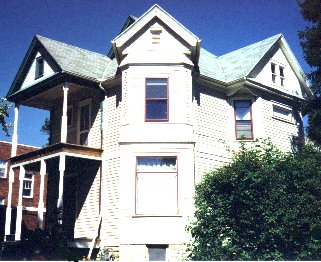 Because my
Dad died just a few months earlier, Mom sold her big three story house
in favor of a smaller cottage. My journal entry for May 4, 1982 reads;
"The church she is selling her house to wants [certain of their members]
to inspect their purchase. We've been working to clean up. What a JOB.
That house looks like it has been abandoned for years. The [sale of the
house] is shaky, so her nerves are bad, BUT - she worked me under the table
- I'll tell you! With all her wheezing and groaning, she just keeps chug-chug-chugging
along. Thursday night she will get the Pope John XXIII award from Viterbo.
It's about time she got some recognition!"
Because my
Dad died just a few months earlier, Mom sold her big three story house
in favor of a smaller cottage. My journal entry for May 4, 1982 reads;
"The church she is selling her house to wants [certain of their members]
to inspect their purchase. We've been working to clean up. What a JOB.
That house looks like it has been abandoned for years. The [sale of the
house] is shaky, so her nerves are bad, BUT - she worked me under the table
- I'll tell you! With all her wheezing and groaning, she just keeps chug-chug-chugging
along. Thursday night she will get the Pope John XXIII award from Viterbo.
It's about time she got some recognition!"
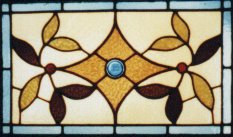 In retrospect,
I realize she needed to leave that house so quickly because she was afraid
my Dad would come back from the dead to visit her. It would open Pandora's
Box if I saw him and started asking questions. She was 83 years old, and
I never saw her work harder!
In retrospect,
I realize she needed to leave that house so quickly because she was afraid
my Dad would come back from the dead to visit her. It would open Pandora's
Box if I saw him and started asking questions. She was 83 years old, and
I never saw her work harder!
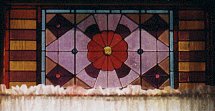 She must have
had Borley Rectory in mind when she bought the place, for it was quite
large, with staircases scattered about, stained glass windows, and an outbuilding
as big as a cottage. Even when the fuel bills threatened to send her to
the poor house, she stayed in the rambling affair, and was never happier
than when she was safely knitting in the basement.
She must have
had Borley Rectory in mind when she bought the place, for it was quite
large, with staircases scattered about, stained glass windows, and an outbuilding
as big as a cottage. Even when the fuel bills threatened to send her to
the poor house, she stayed in the rambling affair, and was never happier
than when she was safely knitting in the basement.
The new house was nothing more than a cottage. One bedroom - one bath. Lots of ants. I do wish I had a picture of it. It is at 765 North Losey Boulevard.
As I looked back on that move to her new house in LaCrosse, I reflected
how easy it was for me to access scores of clues over the years. How I
wished I had taken advantage and confronted Mom with them long ago! Mom
left her private papers and pictures scattered in dresser drawers and jewelry
boxes. I had no trouble reviewing the miscellaneous documents and letters
whenever I wanted - as long as she wasn't home. The aristocratic pictures
were hung with care. The silver award mug given to someone named Fisher
- the one with the glass bottom - was out in plain sight. She even personally
showed me the memorial album to Major S. E. Fisher of the Flying Tigers.
Now then, if Mom was trying so hard to hide some nefarious deed, leaving
things about like that is hardly the way to be discreet! If I were a criminal,
I would take elaborate care to stash incriminating evidence in a locked
trunk, or in a safe deposit box. Mom did neither.
She did make the front page of the local newspaper, for something far different. On August 29, 1982, the LaCrosse Tribune visited one of her many senior citizen activities - Krazy Daze - at the Denton Street Center. This was my mother at her fun-loving best.
On December 4, 1984, the LaCrosse Tribune and the LaCrosse Area Chamber of Commerce honored her with their Good Citizen Award. In part, the newspaper described her as "a tireless champion for the elderly, the poor, and the forgotten." It mentioned her Project Green Thumb wherein "About 1,000 packages of garden seeds were donated and dsitributed to needy residents." We went together to buy the seeds in Appleton WI when I was in the wholesale/retail business. That buying trip was one of our best times together.
Walk a mile for the general
My mother was very experienced at "walking a (figurative) mile
for the general," but she was also very experienced at walking many
real miles to and from work. As she told me, "You and I are both good
walkers - we don't need cars or even bikes - we just put our heads down
against the wind and walk." It was her main method of transportation,
which she only modified after moving to Wisconsin. LaCrosse was too big
for her to walk to all her appointments, and she started taking the bus.
Her legs started giving her troubles, but she was too afraid of doctors
and hospitals to have them tended to. Finally, when she was well into her
eighties and still working, she had to have a knee replaced or face sitting
in a wheelchair. Sitting would have been living hell for her, and so she
had the operation. She was up and around within two days.
Dreams and death
When my first marriage disintegrated in 1985, I sought protection in
the mountains of the west. As Mom got older, I thought it was logical she
would come join me in Utah for her retirement years. She agreed in spirit,
but just couldn't let go of her creations in LaCrosse. We talked about
her desire to have a small place in Green River, Wyoming where she could
be alone and write her book. All she wanted was a couple of rooms, "lined
with books," a small garden, and a pet dog. On the other hand, she
would look at retirement - compare it to her 100 miles per hour life style
- and cry, "What would I do all day?"
Then, on November 28, 1990, she had a stroke while at work. I went to
visit her, and was quite surprised at all the whiskey bottles I found.
They were stashed in every corner of the house, and I filled two large
garbage bags with them. This lady was very lonely, sitting in her house
by herself with only a small dog to comfort her.
When she came out to Utah in 1992, she didn't need a drink, so I am
very grateful she had not become as addicted to alcohol as my father had
become.
She kicked cigarettes easier than he did, too. I think we were in Jamestown
when she decided it just wasn't worth it. She said she hadn't smoked before
the war, and that a lot of people picked up the habit because of the bombing
raids and such. Both Mom and Dad smoked Chesterfields. The irony of that
brand name comes back to me because chesterfield is the English name for
a couch, and we had a chesterfield when I was a child, not a couch.
Dad took a little longer to give up smoking. He knew it was dangerous,
so he tried quitting by switching to cheroots. But it was too late. In
the late 70s he had gone to the Veterans Administration hospital to have
his back operated on, and his chest x-rays were clean. In the middle of
1981, he was in a car wreck, and the resultant x-rays showed he was full
of cancer. He was given six months to live, and that was just about as
long as it took.
I was at a church meeting in Rochester, Minnesota when I received the
phone call to get back to the hospice right away. Dad probably wouldn't
wake up. Mom had only left his side to go home and rest, and she was very
tired, but very concerned.
Dad's sister was at the hospice, with a few of his other shirt-tail
relatives that I can't remember. Somehow, the nurse knew when the last
minute had arrived, so I rushed out of the room to find his sister, who
had stepped out into the hall. When I got back, just a few short seconds
later, it was over.
I grabbed his hand and yelled, "I love you, Dad!" I was praying
his spirit was still hovering close and was able to hear me. His body had
wasted away to almost nothing.
Mom was crying. I was crying. The nurses and everybody in the room were
crying. I am crying now, as I recall those last, quiet moments.
Mom was barely able to walk. It hit her so much harder than I ever imagined
it could. "He made his peace with God, you know," she said over
and over. "He was able to talk to a priest in time, and he made his
peace with God."
For months after that she moaned, "He's calling me. It's my turn
next." It wasn't long before she sold the house.
Family memories
Mom didn't bathe at all during her last years in LaCrosse. She couldn't
get out of her bathtub, so she wouldn't get into it either. The hiatal
hernia made her sick. Her smell made me sick. She still worked full time,
and I wondered how others could stand her odors.
It was hard to talk to Mom about personal cleanliness, although I tried
a couple of times. There were just things you didn't talk about with Marianne
O'Neil. If someone crossed her, she would hunker down in a very thick turtle
shell and wait. She wouldn't grouse or set any traps. "God pays debts
without money," she would scowl, knowing the offender would be justly
"rewarded" - someday.
She did become incensed at one woman, however. It seems that
somewhere along the line after Mom divorced my Dad, he got drunk one night
and remarried a woman named Beverly. That was bad enough, but when this
woman called me up and said, "She's not your real mother, you know
- I'm your real mother," Mom went ballistic. If Beverly had been in
the same room, I am convinced my mother would have...have what?...killed
her? Well, if Mom was ever going to be provoked to do a foul deed, that
was the provocation! Mom never forgave that mortal sin, even after Dad
divorced Beverly and the woman died. It was all such utter nonsense to
me - I never thought anything about it.
Once or twice, Mom panicked more than I thought was appropriate for
the occasion. By the time I was too big for Dad to belt around, I started
yelling back at him. This would really upset her, and we would both back
off for her sake. A very few times, I yelled at her, and she would cringe
in fear. If she got really afraid of us, her thighs would slap together.
I am disgusted that either my dad or myself could cause this reaction.
No one else had this effect on her.
Mostly, she tried to placate us both. With Dad, he got whatever he was
ranting and raving about that night. She gave me things too, but it was
stuff I never asked for. For college, she gave me a very expensive briefcase she
had been given by some other benefactor. After college, she gave me a very expensive camera she had been awarded by the Jamestown Sun. I never knew what I was going to get.
Dad always knew what he wanted, though. If he had a hankering for spaghetti
or steak, or beef tongue or oysters, Mom better have those delicacies ready.
I don't know how she was able to cook at all under his raised hand and
foul mouth. But she always produced. Then, he would eat a few mouthfuls
and pass out. I resented his power over her very, very much. Once, Dad
went on a binge of spaghetti every night for a month. I literally could
not eat spaghetti, or even say the word, for decades after that.
I did enjoy her other cooking, though, and I know Mom liked creating
fancy dishes. She would cut oranges up and make delicious marmalade, or
bake luscious, flaky eclairs. When I was younger, she served our eggs in egg cups with the top cut off. I bought her a mixer when I was VERY young, so I must have been used to her cooking. Even though her kitchen was a mess, she miraculously
managed to pull treats out of it until just about a year before she moved
to Utah. She hated messing with chickens, but that was her best dinner - we even had a RARE guest or two to the house for her roast chicken!
I don't recall her ever using a recipe - although she told me repeatedly that to be a good cook, all you needed to do was follow the directions. She must have cooked frequently somewhere along the line, because she had the recipes in her head. She loved to fish - and prepared everything either one of us caught, even though she did insist I clean them!
Her favorite food was pork chops - pronounced "poke-chops" in fun.
When Mom and I would eat out, she always gave her desert to me. She
said, "Mother's pie always tastes best."
There were other pleasant memories of Mom and Dad. There was the time
they both came to see me when I graduated from Utah State University in
Logan, Utah. Dad saw snakes in the house during some delirium tremors caused
by alcohol withdrawal. But he also saw a real American Bald Eagle glide
across our hood while we were driving in Wyoming. He also saw hundreds
of antelope, and beautiful skies. Mom got to see a real ghost town.
Oh, it wasn't the classic deserted type with weather-beaten boards creaking
in the wind. But most of the buildings were empty, and we did manage to
find a few gold tailings next to a worn-out mine. It was hard for her to
leave.
I also remember all the dogs we had over the years. After each one died,
Mom would say, "That's it. No more." But another one would show
up. True to my mother's upbringing, I was the one who held my dogs when
they had to be put to sleep.
I "inherited" Mom's last dog, a small terrier. Lisa originally
belonged to another lady who brought the dog over to Mom's house while
she went on a trip. The original owner kept Lisa in a dog cage. Mom would
have none of that, and promptly released the dog.
When the owner came back from her trip, Lisa bit her. Lisa became Mom's
dog that day.
Lisa bit anyone else who came within 20 feet of my mother. Except me.
From Day One, Lisa accepted me. It was not a very big transition for Lisa
to come and live with me after Mom broke her hip.
Lisa was "middle-aged" when Mom got her, and she was very
old by 1992. Her time to join Mom finally came in the late fall of 1993.
This time, I couldn't hold her for that final goodbye. I put her in the
cage at the animal shelter and felt her staring, blind eyes follow me all
the way out to the car. I bawled like a baby.
Many of those tears were for my mother. I had not broken down like this
when mother died, but Lisa's death served as a catalyst, and the affect
of loosing both of them overwhelmed me.
For the people
I remember the biggest project my mother created was Harbour Lights.
Of all her creations to help people, I identified the most with this one.
I even pitched in to help once in a while.
It took her several years to get the project off the ground, and it
was eventually squeezed out of existence, but it was wonderful while it
lasted.

Harbour Lights was an all-purpose center. She took an empty building
and turned it into a haven for all comers. She purposely created it downtown
so that indigents, winos, released prisoners, and even prostitutes would
have a comfortable place to go while they got their lives in order. It
did not have sleeping arrangements like she envisioned, and it never lived
up to the full potential Mom dreamed for it, but the concept was gracious
and noble. This was years before the homeless movement became so prominent
throughout America. If she had been able to carry this project to its full
potential, she would have had one of the first homeless shelters in the
United States.
The building she ended up with, however, was large enough to
house woodworking and other arty projects. It also had a TV room, and a
place to play cards. A bakery donated day-old rolls. The coffee pot was
always on.
Harbour Lights probably lasted a couple of years before the building
was demolished in favor of a fast-food restaurant. I could never figure
out why the city or the county didn't keep the concept alive. It was a
tremendous effort.
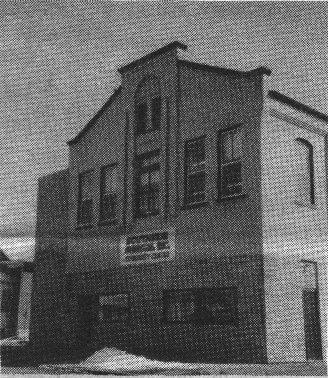 Her biggest
success was the South Side Community Center on Denton Street. Around 1969(?), the city
sold her an abandoned fire station for one dollar. She gathered some friends
together to form a legal corporation and then mortgaged the building in
order to fix it up. The South Side Senior Citizens put in a new furnace,
a dropped ceiling, an elevator, paneling, a new kitchen, and a new floor.
They held enough successful rummage sales to burn the mortgage years ahead
of schedule. That building was constantly full of people taking music lessons,
playing bingo, having parties, and holding rummage sales. My mother started
oral history and political awareness classes at the center. She started
a deaf club, a handicapped group, and visits for the blind. She made the
center an off-campus station for the local technical institute. The center
obtained city and state restaurant licenses, and played host to many tours
from the surrounding area.
Her biggest
success was the South Side Community Center on Denton Street. Around 1969(?), the city
sold her an abandoned fire station for one dollar. She gathered some friends
together to form a legal corporation and then mortgaged the building in
order to fix it up. The South Side Senior Citizens put in a new furnace,
a dropped ceiling, an elevator, paneling, a new kitchen, and a new floor.
They held enough successful rummage sales to burn the mortgage years ahead
of schedule. That building was constantly full of people taking music lessons,
playing bingo, having parties, and holding rummage sales. My mother started
oral history and political awareness classes at the center. She started
a deaf club, a handicapped group, and visits for the blind. She made the
center an off-campus station for the local technical institute. The center
obtained city and state restaurant licenses, and played host to many tours
from the surrounding area.
Politicians loved to come to the center every February for the biggest
party of all, Mom's birthday. It was a happy place, and created many fond
memories for the people who took advantage of its services. I even showed
up occasionally - to much fanfare. "That's Marianne's boy," the
crowd would murmur in approval. I received an even bigger welcome when
I brought my wife and our six children. "Those are Marianne's grandchildren,"
they would say, with big smiles.
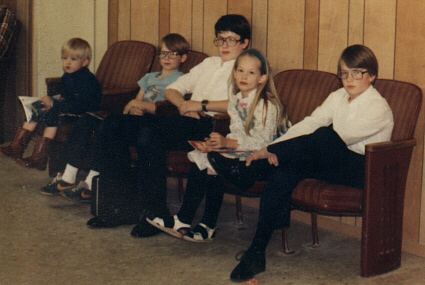
Marianne's grandchildren at the Denton Street Center - early 1980s
Mom also opened a couple of stores for the seniors to sell craft items.
These were in different locations during the holiday seasons, and did quite
well. In 1967, the outlet store grossed $750, and was supported by 78 different
people who brought in their crafts. Again, I could never figure out why
backers didn't come forth and keep this project going year 'round. I know
my mother sold a ton of hats out of those places! She received bags and
bags of rejects from the local factory that made knitwear. She repaired
them, and no one could tell them from the professional product. She sold
literally hundreds of hats and mittens over the years.
Another outfit did take her storefront idea and run with it. This group
took over an entire floor in an empty store, and sold craft items all year.
In fact, this type of store is now quite prominent in many communities.
Mom was always on the forefront of developing community projects. Then
others would come up with a similar plan and have great success. She usually
didn't mind others running with her "inventions." Usually. But
there were occasions when she thought competing projects were created specifically
to steal her thunder. Even then, she would see if any good was being done,
swallow, and press on. As long as the public was being served - that was
what counted.
She wrote a "History of Southside Multi-Purpose Center March 21, 1972. It shows the incredible progress she made in only a few years!
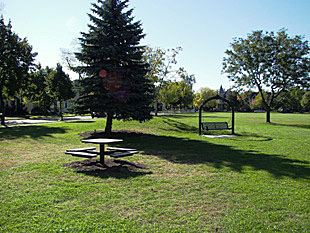
When old Central High School was torn down - it was formerly at the corner of 16th and Cass, within eye shot of her home - the block stood empty for some time. The City of LaCrosse web site emphasizes her recurring theme: "Weigent Park started when the high school was vacated in 1967. In 1971, the city had to figure out what to do with the school building and grounds. Marianne O'Neil suggested to be used as a self-supporting community center." It stayed a park, but Mom never gave up.
In her last years, she was very concerned about abortion. If it had
not been such a politically hot item, I'm sure she would have tackled it
head on. She feared it. She feared this control over life would some day
expand. To her, the next logical expansion was euthanasia. Assisted suicide
was also absolutely wrong. Given such authority, "the powers that
be" could then decide to eliminate the severely retarded, and then
what group would be next? "What gives anyone the right to decide who
should live and who should die," she would sigh with a weary look.
"What gives anyone the right to play God?"
Education was very important to her. During all our moves, we always
had tons of books to box up. We had some fancy bookcases with lift-up glass
doors, and I became quite expert at taking them apart and rebuilding them.
There were encyclopedias and first editions among the many volumes. One
of the oldest books was a first edition of "The Book of Nonsense"
by Edward Lear.
She was constantly asking me to "bring me home a good murder mystery
from the library." She had read most of the books I brought her, so
it became quite a challenge to find her something new. I have inherited
her love of books, and have taken to calling our restroom the "library"
just as she did. We share the habit of reading anything left laying about.
She wanted me to cultivate as much culture as possible, but wasn't above
current trends. I will never forget the awe I experienced when she
took me to an extremely loud rock concert - Bachman Turner Overdrive!
BTO was one of my favorite groups in the mid-70s, and I thoroughly enjoyed myself. Much
of my enjoyment came from watching my mother sit right next to me! Unreal!
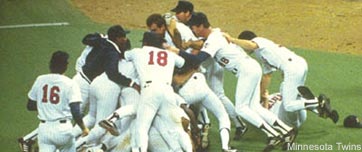
Having her take me to a rock concert may have astonished me, but she
was always doing unexpected things with her friends. She tried her darndest
to enjoy life! She wanted to live 100 years and soak in everything she
could. She shocked me again in October of 1987 as the Minnesota Twins played in the World Series. I stopped by during a business trip, and we watched as many games as we could on her old black-and-white television set. The reception was lousy, but she didn't care - and she actually knew what was going on!
While always friendly on the outside, she took very few people into
our home, and even less into her confidence. One family in LaCrosse tried
to get close to her and invited her to visit their home whenever she could.
"She never stayed long," the wife recalled, "and the conversations
were usually one-sided. She never confided anything of her past to either
of us, although she told us stories of visiting her father's patients,
and other travel tales. I really liked your mother's sense of humor and
I came to understand her forthright way. I felt very close to your mother
and yet actually knew very little about her personal life. It didn't matter."(3)
Without her scrapbook available to me, it is impossible to list all
the various projects she was responsible for in LaCrosse, but there was
a bunch of them: recognition for those over 100 years of age; fingerprinting;
meals to the homebound; safety seminars; daily check-up phone calls; consumer
alert classes; cooking schools; picnics in the park; bus trips and tours
of neighboring cities; bowling; and talent shows for senior citizens. The
winners of the talent shows even went on to higher competition, just like
the Miss America pageants. Most of these projects were innovations at the
time.
She was a strong supporter of the Western Wisconsin Technical Institute (WWTI) - nicknamed "Wee-Wee Tech." I'm not sure how deeply her involvement became, but a front page newspaper article from 20 June 1986 illustrates her very active dedication to education.
In a letter to the committee that sponsored her Pope John XXIII Award,
she outlined some of the work she initiated:
We pioneered in glaucoma mass screening. Every opthamologist in the
city took part as well as all clinics and both hospitals.
Dr. Eric Gunderson taught mouth-to-mouth resuscitation to senior
citizens.
Preventive medicine forums took place under sponsorship of local
clinics.
English Lutheran Church made space available for large events such
as social work information fairs and senior citizens meetings.
Hobby fairs were successfully held in the YMCA and later in the Mary
E. Sawyer Auditorium.
This office offers counseling information and referral, friendly
visitors, retirement counseling, and in innovative chore service [for the
elderly and disabled]. Through cooperation with city hall and the police
department, we provided a senior citizen identification card.
This worker has been a member of the Chamber of Commerce since 1974
and has served on state and federal legislative programs. She has served
by appointment [of the governor] on the State Board of Aging and on the
State Advisory Board. She received a Certificate of Recognition for Dedicated
Service to Others from the city of LaCrosse. She was appointed by the governor
to serve on the executive committee of the Community Care Project. She
served on the Community Action executive board and received a citation
for services. She is a member of the National Council on Aging.
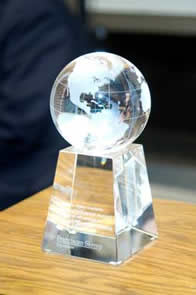 In 1987, she was give the Sphere of Influence Award by the Franciscan Skemp Foundation. "Presented annually since 1983, the Spheres of Influence Award recognizes those who have made exemplary contributions to the physical, mental and spiritual health of others." (LaCrosse Tribune, 20 January 2003). Program and related documents.
In 1987, she was give the Sphere of Influence Award by the Franciscan Skemp Foundation. "Presented annually since 1983, the Spheres of Influence Award recognizes those who have made exemplary contributions to the physical, mental and spiritual health of others." (LaCrosse Tribune, 20 January 2003). Program and related documents.
The list of projects is impressive. What is even more impressive, however,
is the list of people each of these projects served. She dedicated herself
to serving others. Unselfishly and without hesitation, she was always there
- night or day - to help someone in trouble, someone who was lonely, or
someone who just needed a smile to brighten their day.
In 1999 I wrote a letter to the editor of the Lacrosse Tribune asking people to remember my mother. I received several responses.
One of her friends(4) from LaCrosse told
me:
Marianne did not just 'serve' on any board. She was verbal; she
offered solutions to problems; she was a mediator; she pour 'quieting
oil' on many a dispute. Often at a meeting one would hear her say [while]
rapping her slender knuckles on the board table for attention, "Madame/Mister
Chairman! I would like to move that we table this discussion until we can
get more information that will lead to a solution." It always worked.
The friend told how my mother became deeply involved in several pilot
projects:
Marianne became a member on the board of the Community Action Program.
The early childhood program Head Start was integrated under that umbrella.
Head Start was a new program. We had few guidelines and needed to
educate the public who were vehemently against four year old [children]
going to any school, let alone a government subsidized one.
Lots of arguments arose. Marianne was in the thick of it, but never
threw her hands in the air and abandoned it. She would go around if she
couldn't go through an issue, always seeking what was best for all.
Today, Head Start is well established all over the U.S. and in every
city in Wisconsin.
The LaCrosse friend then got personal:
While I never had a picture of her, I have one in my memory - red
haired, smiling, out-going, enthusiastic, and with her distinctive speech.
Oh, she was a help to the community alright, but she was also very aware
of the individual as well.
They don't make "Mariannes" any more, for she could be
crusty and adamant if she had to; gentle, concerned and caring, just as
easily.
I called her toward the twilight of her life and told her how much
she had helped me personally - she encouraged me to go on and get a masters
degree - and I said, "Marianne, I want to thank you for that, and
for all you have done for our community." I recall her reply was,
"I am glad I could help. You know, I really like to be in the middle
of a fray." And she was.
Marianne gave me some of her strength - by exposure, I guess. I have
needed it. Since my husband died, I have had breast cancer, and my youngest
daughter died of Lou Gehrig's Disease, leaving two young sons. Marianne
just "kept going" too. She taught me
Worry never robs tomorrow of its sorrow;
It only saps today of its strength.
May your memories of her be warm ones. It may warm your heart to
know she would speak of you often - "my son, Vince."
Another one of her acquaintances in LaCrosse(5)
told me, "Your mother touched many lives here - for the better. I
was fascinated by your mother's wit and humor. Since I was writing to a
pen pal in England. . .I asked her if she'd ever seen Winston Churchill
during WWII. She told me, 'Oh, honey, we saw so much of him we got sick
of him!'"
Still another friend(6) wrote, "She
would do anything for anyone in need. She even offered to make me an outfit
for Oktoberfest. . . .I [still] have some jewelry she gave me. . .Your
mother was one of a kind."
She may not have been a faithful church-goer, but she surely lived up
to the LDS scripture, "When ye are in the service of your fellow beings,
ye are only in the service of your God." (Mosiah 2:17)
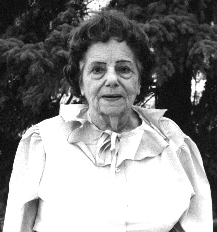 The inscription on her Pope John XXIII award reads, "A well-ordered
human society requires that its members recognize and observe their mutual
rights and duties... When the relations of human society are expressed
in terms of rights and duties, men and women become conscious of spiritual
values, understand the meaning and significance of truth, justice, charity
and freedom, and become more deeply aware that they belong to this world
of values. Moreover, when moved by such concerns, they make the ties that
bind them to God the solid foundation and supreme criterion of their lives:
both that life which they live interiorly in the depths of their own soul
and of that in which they are united to others in society." (Pope
John XXIII, "Pacem in Terris," April 11, 1963.)
The inscription on her Pope John XXIII award reads, "A well-ordered
human society requires that its members recognize and observe their mutual
rights and duties... When the relations of human society are expressed
in terms of rights and duties, men and women become conscious of spiritual
values, understand the meaning and significance of truth, justice, charity
and freedom, and become more deeply aware that they belong to this world
of values. Moreover, when moved by such concerns, they make the ties that
bind them to God the solid foundation and supreme criterion of their lives:
both that life which they live interiorly in the depths of their own soul
and of that in which they are united to others in society." (Pope
John XXIII, "Pacem in Terris," April 11, 1963.)
Chapter Fifteen
Table of Contents
1. Judge Eugene Toepel
2. Senators Gaylord Nelson and William Proxmire.
3. Jim and Peg Parry
4. Opal Nestingen
5. Susan Jacobs-Claussen
6. Viola Strand
 Much to the chagrin of her new boss, my mother started working after hours
in a new arena - senior citizens. She started slowly by organizing talent
and craft shows, and continued upward from there. More than once she donated
her vacation time to set up these events. She became one of the first people
in the United States to organize activities and programs for seniors. Her
life was about to make another dramatic change as her influence increased.
Much to the chagrin of her new boss, my mother started working after hours
in a new arena - senior citizens. She started slowly by organizing talent
and craft shows, and continued upward from there. More than once she donated
her vacation time to set up these events. She became one of the first people
in the United States to organize activities and programs for seniors. Her
life was about to make another dramatic change as her influence increased.
 Her new position was tentative at first, and the Committee started out
with a one year charter under the direction of the mayor's office. She
kept building support for the work, and was then granted recognition as
a United Way agency. Her budget was never larger than wages for herself
and a secretary, but she managed to find funding and moral support for
almost 30 years.
Her new position was tentative at first, and the Committee started out
with a one year charter under the direction of the mayor's office. She
kept building support for the work, and was then granted recognition as
a United Way agency. Her budget was never larger than wages for herself
and a secretary, but she managed to find funding and moral support for
almost 30 years.  In LaCrosse, my mother kept plugging away and expanding her influence -
first to the state level, and then on a national scale. She was offered
a job in New York, but turned it down. She was offered several chances
to run for political office but turned them all down. She racked up friendships
with scores of people as she helped them. She also made a few enemies along
the way as she tried to remain autonomous and expand her services.
In LaCrosse, my mother kept plugging away and expanding her influence -
first to the state level, and then on a national scale. She was offered
a job in New York, but turned it down. She was offered several chances
to run for political office but turned them all down. She racked up friendships
with scores of people as she helped them. She also made a few enemies along
the way as she tried to remain autonomous and expand her services.  Because my
Dad died just a few months earlier, Mom sold her big three story house
in favor of a smaller cottage. My journal entry for May 4, 1982 reads;
"The church she is selling her house to wants [certain of their members]
to inspect their purchase. We've been working to clean up. What a JOB.
That house looks like it has been abandoned for years. The [sale of the
house] is shaky, so her nerves are bad, BUT - she worked me under the table
- I'll tell you! With all her wheezing and groaning, she just keeps chug-chug-chugging
along. Thursday night she will get the Pope John XXIII award from Viterbo.
It's about time she got some recognition!"
Because my
Dad died just a few months earlier, Mom sold her big three story house
in favor of a smaller cottage. My journal entry for May 4, 1982 reads;
"The church she is selling her house to wants [certain of their members]
to inspect their purchase. We've been working to clean up. What a JOB.
That house looks like it has been abandoned for years. The [sale of the
house] is shaky, so her nerves are bad, BUT - she worked me under the table
- I'll tell you! With all her wheezing and groaning, she just keeps chug-chug-chugging
along. Thursday night she will get the Pope John XXIII award from Viterbo.
It's about time she got some recognition!"  In retrospect,
I realize she needed to leave that house so quickly because she was afraid
my Dad would come back from the dead to visit her. It would open Pandora's
Box if I saw him and started asking questions. She was 83 years old, and
I never saw her work harder!
In retrospect,
I realize she needed to leave that house so quickly because she was afraid
my Dad would come back from the dead to visit her. It would open Pandora's
Box if I saw him and started asking questions. She was 83 years old, and
I never saw her work harder!  She must have
had Borley Rectory in mind when she bought the place, for it was quite
large, with staircases scattered about, stained glass windows, and an outbuilding
as big as a cottage. Even when the fuel bills threatened to send her to
the poor house, she stayed in the rambling affair, and was never happier
than when she was safely knitting in the basement.
She must have
had Borley Rectory in mind when she bought the place, for it was quite
large, with staircases scattered about, stained glass windows, and an outbuilding
as big as a cottage. Even when the fuel bills threatened to send her to
the poor house, she stayed in the rambling affair, and was never happier
than when she was safely knitting in the basement. 
 Her biggest
success was the South Side Community Center on Denton Street. Around 1969(?), the city
sold her an abandoned fire station for one dollar. She gathered some friends
together to form a legal corporation and then mortgaged the building in
order to fix it up. The South Side Senior Citizens put in a new furnace,
a dropped ceiling, an elevator, paneling, a new kitchen, and a new floor.
They held enough successful rummage sales to burn the mortgage years ahead
of schedule. That building was constantly full of people taking music lessons,
playing bingo, having parties, and holding rummage sales. My mother started
oral history and political awareness classes at the center. She started
a deaf club, a handicapped group, and visits for the blind. She made the
center an off-campus station for the local technical institute. The center
obtained city and state restaurant licenses, and played host to many tours
from the surrounding area.
Her biggest
success was the South Side Community Center on Denton Street. Around 1969(?), the city
sold her an abandoned fire station for one dollar. She gathered some friends
together to form a legal corporation and then mortgaged the building in
order to fix it up. The South Side Senior Citizens put in a new furnace,
a dropped ceiling, an elevator, paneling, a new kitchen, and a new floor.
They held enough successful rummage sales to burn the mortgage years ahead
of schedule. That building was constantly full of people taking music lessons,
playing bingo, having parties, and holding rummage sales. My mother started
oral history and political awareness classes at the center. She started
a deaf club, a handicapped group, and visits for the blind. She made the
center an off-campus station for the local technical institute. The center
obtained city and state restaurant licenses, and played host to many tours
from the surrounding area. 


 In 1987, she was give the Sphere of Influence Award by the
In 1987, she was give the Sphere of Influence Award by the  The inscription on her Pope John XXIII award reads, "A well-ordered
human society requires that its members recognize and observe their mutual
rights and duties... When the relations of human society are expressed
in terms of rights and duties, men and women become conscious of spiritual
values, understand the meaning and significance of truth, justice, charity
and freedom, and become more deeply aware that they belong to this world
of values. Moreover, when moved by such concerns, they make the ties that
bind them to God the solid foundation and supreme criterion of their lives:
both that life which they live interiorly in the depths of their own soul
and of that in which they are united to others in society." (Pope
John XXIII, "Pacem in Terris," April 11, 1963.)
The inscription on her Pope John XXIII award reads, "A well-ordered
human society requires that its members recognize and observe their mutual
rights and duties... When the relations of human society are expressed
in terms of rights and duties, men and women become conscious of spiritual
values, understand the meaning and significance of truth, justice, charity
and freedom, and become more deeply aware that they belong to this world
of values. Moreover, when moved by such concerns, they make the ties that
bind them to God the solid foundation and supreme criterion of their lives:
both that life which they live interiorly in the depths of their own soul
and of that in which they are united to others in society." (Pope
John XXIII, "Pacem in Terris," April 11, 1963.)